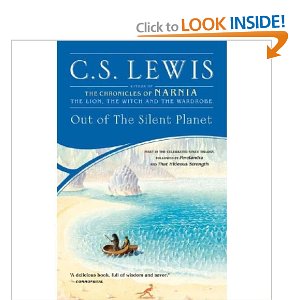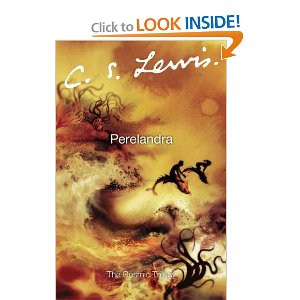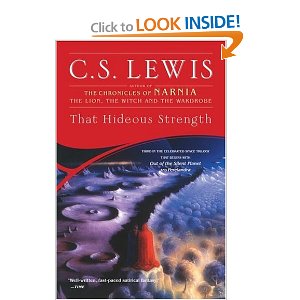. . . but yesterday I wrote this post about how, sometimes, your efforts are actually an obstacle to spiritual progress, and you just have to step aside and let the Holy Spirit work. And then, just a few hours later, I read this passage from C. S. Lewis’ Perelandra.
(Ransom, on an unfallen planet with an unfallen Lady, has been doing battle with his nemesis, and has just made the horrible realization that, if “the Un-Man” is the representative of Hell, then he himself must be the representative of Heaven.)
‘Oh, but this is nonsense,’ said the voluble self. He, Ransom, with his ridiculous piebald body and his ten times defeated arguments – what sort of a miracle was that? His mind darted hopefully down a side-alley that seemed to promise escape. Very well then. He had been brought here miraculously. He was in God’s hands. As long as he did his best – and he had done his best – God would see to the final issue. He had not succeeded. But he had done his best. No one could do more. “‘Tis not in mortals to command success.’ He must not be worried about the final result. Maleldil would see to that. And Maleldil would bring him safe back to Earth after his very real, though unsuccessful, efforts. Probably Maleldil’s real intention was that he should publish to the human race the truths he had learned on the planet Venus. As for the fate of Venus, that could not really rest upon his shoulders. It was in God’s hands. One must be content to leave it there. One must have Faith ….
It snapped like a violin string. Not one rag of all this evasion was left. Relentlessly, unmistakably, the Darkness pressed down upon him the knowledge that this picture of the situation was utterly false. His journey to Perelandra was not a moral exercise, nor a sham fight. If the issue lay in Maleldil’s hands, Ransom and the Lady were those hands. The fate of a world really depended on how they behaved in the next few hours.
The thing was irreducibly, nakedly real. They could, if they chose, decline to save the innocence of this new race, and if they declined its innocence would not be saved. It rested with no other creature in all time or all space. This he saw clearly, though as yet he had no inkling of what he could do.
The voluble self protested, wildly, swiftly, like the propeller of a ship racing when it is out of the water. The imprudence, the unfairness, the absurdity of it! Did Maleldil want to lose worlds? What was the sense of so arranging things that anything really important should finally and absolutely depend on such a man of straw as himself? And at that moment, far away ; on Earth, as he now could not help remembering, men were at war, and white-faced subalterns and freckled corporals who had but lately begun to shave, stood in horrible gaps or crawled forward in deadly darkness, awaking, like him, to the preposterous truth that all really depended on their actions; and far away in time Horatius stood on the bridge, and Constantine settled in his mind whether he would or would not embrace the new religion, and Eve herself stood looking upon the forbidden fruit and the Heaven of Heavens waited for her decision. He writhed and ground his teeth, but could not help seeing. Thus, and not otherwise, the world was made. Either something or nothing must depend on individual choices. And if something, who could set bounds to it? A stone may determine the course of a river. He was that stone at this horrible moment which had become the centre of the whole universe. The eldila of all worlds, the sinless organisms of everlasting, light, were silent in Deep Heaven to see what Elwin Ransom of Cambridge would do.
Oh, boy. I think my 14-year-old is old enough to read at least the first two books of Lewis’ Space Trilogy. In rereading Perelandra (which is book two), I’m amazed at how many of my ideas about what God is like, how grace works, how evil works, and what we are actually here for came from these books.



I had to read the passage closely because of my un-familiarity with the writings of Lewis. Could it be said that we creatures are necessary for the fulfillment of our Heavenly Father’s great plan for each and every one of us.
It’s definitely a balance between remember that we are God’s hands in the world, and remembering that we are kind of the worst hands ever.
@Simcha. Like.
I’m transfixed–moderately electrified, and caught between the urge to rush down to the bookcase to dust off tattered relics which will help guide me unto Truth..
I have an unquenchable thirst for.a map, a key to this poor tumultuous life..
.(sigh)
I am in a struggle with THIS
…and my need to go
to the grocery store–
to buy food.
But my consciousnesses has been raised!
I am on a mission
to cook dinner.
I am a smudged around the corners superhero.
I am a miserable, chapped lipped superhero; late in going to the grocery store because I read too many things on the internet this morning-
–but this,
THIS rose before me like a shining city, discerned through parted clouds.
I am galvanized in my misery.
My “yes” matters!
THIS *particular* “yes” matters.
.
(all kidding aside)
Thank you
I will shop with heightened awareness, which is always a good thing :)!
My favorite scene in Perelandra is the one where Ransom realizes he can’t out-argue the devil and has to just slug him.
Yeah! “‘In the name of the Father, and of the Son, and of the Holy Spirit, here goes! I mean, Amen!'”
Great passage. It’s been a long time since I read those books and when I did I was a very young Evangelical still living off the accumulated spiritual capital of my parents. I remember being almost offended by the books’ themes of “reality is real,” “matter matters,” “choices effect change,” etc. These things don’t fit well with a once-saved-always-saved/Jesus-has-forgiven-your-sins-past-present-and-future theology. Now I see them as being foundational to Christianity and integral to a broad, incarnational understanding of What It’s All About.
Is there something about the third book that makes you hesitant to give it to a 14 year-old? I’m just curious and, like I said, it’s been a long time since I’ve read them.
You know, I don’t really know what it is about the third book. I can recognize that it has important themes in it, and the story is amazing – and some of the scenes are unforgettable, like when Mark finally makes a stand. I guess this book kinda reveal’s Lewis’ tendency to retreat a little bit into caricature, when building characters, in order to forward his ideas. Maybe I expect too much, because Lewis is SO good, but I just found this one a little bit irritating – the Dennistons saying “We like weather” and so on. On the other hand, some of the little details about characters are really fantastic. I often think of Mr. Dimble’s face showing a brief moment of distaste for Mark, which was swiftly chased away by long practice, by a more charitable attitude . I guess I wouldn’t discourage a 14-year-old from reading it, but I wouldn’t feel terrible if they never got around to reading it. I feel like the other two are must-reads.
I also have always been turned off by Arthurian stuff, so the whole Fisher King thing struck me as unpleasant.
The “everything’s mating, animals and humans alike!!” bit at the end of “That Hideous Strength” is just weird. Also, the “just ignore your silly wife babbling on” bit bugs me too. It’s how the wives connect with their husbands: the little, apparently inane, details of the day are important because that’s *life* for her. I don’t mind the Arthurian stuff per se (it’s just part of the Britishness of the author, I think), but in this book it becomes a “how do I get out of this… oh, I know, a magician!” trick.
“That Hideous Strength” does have some good points about modern evil and how it works (I still can’t believe that there’s actually a N.I.C.E. in Britain today), but the story isn’t the best.
Hmmm…from your descriptions of the third, I think maybe I should have said “it’s been a long time since I read the first two books.” None of that sounds familiar. All the more reason to revisit them. And Wikipedia tells me THS is dystopian…and oh man do I love dystopian stories.
Okay, this is off topic of his space trilogy, but on topic of Lewis and your post a couple days ago about George MacDonald not being a choice story teller, while his stories are fantabulous. Here is what Lewis said about MacDonald, whom he indeed did call “master” in his intro to “Phantastes”:
“If we define Literature as an art whose medium is words, then certainly MacDonald has no place in its first ranks-perhaps not even in its second——–The texture of his writing as a whole is undistinguished, at times fumbling. Bad pulpit traditions cling to it; there is sometimes a nonconformist verbosity——-What he does best in fantasy-fantasy that hovers between the allegorical and mythopoeic. And this, in my opinion, he does better than any man.”
He goes on to say that MacDonald’s stories are where his gold is, not his telling, as it is with myth. Myths can be told and retold, it is the stories themselves, and not the teller that contains the magic.
I know this doesn’t belong under this post, But your idea that MacDonald might deserve a retelling, it just seems like your beloved Lewis would agree with you.
Wow, thanks! I feel pretty great to hear that. Also, after I wrote that post, the kids saw the book out (The Princess and the Goblin)and asked me to start reading it again, which I did, and we are all enjoying it!
I think that there are difficult moments in that book, but over all, it is easy to grasp the story line and the beauty of it all. I read it to my two oldest when they were in kindergarten and first grade, at that point, they were too young to understand they weren’t “getting it”, but just loved the thing as a whole.
How interesting that That Hideous Strength is the least favorite of so many, when it was my absolute favorite. Then again, I’m an Arthurian lit. specialist. The characterization of women didn’t bother me at all, actually.
Just FYI for homeschoolers following Mother of Divine Grace, the trilogy is part of the curriculum for high school seniors.
You might have a look at Lewis’ non-fiction book, “The Discarded Image”. It’s a lovely book, lyric and readable, about the cosmology of the Middle Ages. It’s quite good by itself, of course. But I think it helps with the space trilogy because it gives a good sense of how beautiful the image of space was that informs those books.
I like THS, but a lot of it is commentary on the intellectual changes (and secularization) in the universities in the 20th cent., and the first 40 pages are utterly boring. It’s mostly in-house for his peers in academia and folks like the Newman society concerned with the moral compass and curriculum of the schools. Another of his non-fiction books that sheds light on this book’s themes is “The Abolition of Man”, probably the most Chestertonian of his works.
That Hideous Strength is my favorite of the three, but I love mythology and medieval literature, so maybe that is why. Also I think there is a lot of insightful commentary about marriage in it. Maybe it seems dated or too British, but to me it seemed both helpful and beautiful.
Perelandra and That Hideous Strength are my favorites. I like the latter, not because of literary allusions nor well-drawn characters; I love that when things looked completely and overwhelmingly hopeless by the world’s standards, victory was had by people-who-were-nothing-special who stood and waited (when that was the assignment) and then took decisive action when that time came. Deus ex machina indeed.
I thought about this illustration of spiritual warfare a lot after the last election. It says to me, “Don’t despair.” And it also says, at the time of triumph, there will be marvelous party clothes. (Yes, that’s way down the list of important issues, I realize.)
Simcha, when I was a young teenager, I was guided to Perelandra by a wonderful Passionist Father. I then read Mere Christianity also, and CS Lewis gave me a new vision of my world- a converted vision. He was absolutely key to my ability to grow in faith then.
Thanks for writing about the Space Trilogy again. I always stumble over trying to describe THS to people and this helps a lot: your writing and the discussion as well. When I read the “don’t mind her babble” part I just chuckled at yet another confirmation of my image of Lewis as slightly clueless about women — in a harmless, British sort of way– and even despite that I always find myself moved by the whole “Jungle of fertility” thing.
I did withold THS from my voracious-reader 10yo; although some of Perelandra sets me on edge thinking about him reading it…but then again he is so innocent, really, yet in conflict with a knowing world already, and I think that would resonate with him in a way he probably won’t get for a while but might be good for him.
I’m not a fan of the Arthurian stuff, either. In fact I always look at it kind of slant-eyed…hearing from people who like that stuff makes me realize it really is an aesthetic, of sorts, and not just Lewis skirting too closely with paganism. (Of course, I think many of his other works put his admiration for, and theology of, the pagan/ancient in perspective. Just this one is hard to process out of context.)
I think Lewis has helped articulate a great deal of my theology and cosmology as well. In particular, on my last reading of the Trilogy as an adult, the idea that we can literally have almost no conception of what the Creator of The Universe is and wants, much less try to stomp our feet at His power and Mystery. And that our fuzzy modern Christian ideas of G-d probably have lost a lot of that majesty of the inscrutible Timelord of old.
Finally, I am with Simcha and Rebecca on Ransom’s prayer and tussle with Satan. Remembering it now, I will be incorporating it into my morning offering.
And reading this I realize I haven’t properly articulated my thoughts at the end about G-d the Creator and cosmology…I sound very pagan, too… This is why it is hard to explain! Anyway, hopefully what I wrote is also too boring for anyone trolling for perceived deviation from Catholic Orthodoxy to read and link to ad infinitum whenever I join other discussions on the internet.